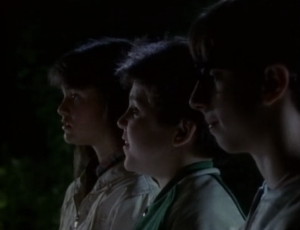There we have it, folks: every important theme in The Wonder Years bundled up in 22 minutes.
Growing up is loss: Of innocence, of old friendships, of cherished memories — sometimes, of hope. The destruction of their childhood hangout feels like a perversion, but everyone’s in on it. Their parents knew it was coming. The rest of the town is willing to smile and pat them on the head, but sees it as just a vacant lot.
In his despair about the impending apocalypse of his childhood, Kevin faces a crisis of meaning: How many kids have walked through the halls of his high school, leaving behind nothing but their childhood purity and maybe a few carved initials. In that moment in the vice principal’s office, “nothing seemed permanent anymore.”
Sitting in the office, Kevin makes a tough realization: Growing up is inevitable. Paul and Winnie might try and resist it, proposing an implausible plan to chain Winnie to bulldozer, but it wouldn’t work. And even if it did, they were just delaying the inevitable.
Plus, what did it matter? The three can’t even agree when they carved their initials into the tree. For a moment, Kevin can’t even convince himself that Harper’s Woods matters. Youth is transient, memories fade: what does it all matter?
Winnie doesn’t give an answer so much as an assertion: They can take our woods and our childhood, but we’ll always hold a piece of it. Facing the black, unnavigable abyss that is the future, “some curse the darkness, others play hide and seek.” Winnie, Paul, and Kevin make a mutual agreement to cherish their memories and their friendships even as the world around them is in a hurry to forget.
Whose Woods Are These? isn’t particularly noteworthy on a storytelling or character level, but on a literary level, it’s as profound and confident as The Wonder Years gets.
Assorted other thoughts on the episode:
- It’s pretty fitting that the park is being cut down and turned into a shopping center. Think about the premier public places to spend time with your friends as you grow up: When you’re younger, it’s the park or the playground. When you’re older, it’s the mall, store, or restaurant.
- This episode marks an important first for the series: A plot involving Winnie that’s not primarily romantic! I’ve been waiting for one of these. Danica McKellar keeps getting better and better.
- The motif of carved initials is used throughout the episode: On the tree, in the vice principal’s office, and finally in the cement. It’s a nice touch for the ending, suggesting that growing up is inevitable but that we can still leave an imprint, even a small one, wherever we go.
- Thinking back on the open scene, I think there’s some strong symbolism there: Kevin destroys a baseball (childhood leisure) with a lawnmower (adolescent pressures), and he gets distracted by Winnie Cooper (sexual awakening).
- The loss of Harper’s Woods was made more meaningful to viewers by the fact that it already played a pivotal role in the series history: the site of the Kevin’s and Winnie’s kiss in the pilot, a shown again in this episode.
- Harper’s Woods is more than a little bit like the Garden of Eden. A paradise of fond childhood memories and first kisses, but a paradise that has to be lost by the inevitability of growing up/bulldozers. Also, Harper may be a reference to harp-playing angel.
- I was trying to figure out when the flash-forward at the end of the episode takes place. We see a kid riding a skateboard, which makes me think that it’s supposed to be present day (1989).
- Consistently throughout the series, Winnie Cooper has made intentional acts to preserve innocence, and she’s the one who starts the game of hide and seek at the end. Perhaps it’s because she associates growing up with the pain of losing her older brother, but Winnie seems even more confused by the world changing around her, growing up in “advances and retreats” as suggested in Swingers.






Pingback: There’s something about musings… « The tales that the sea beholds …